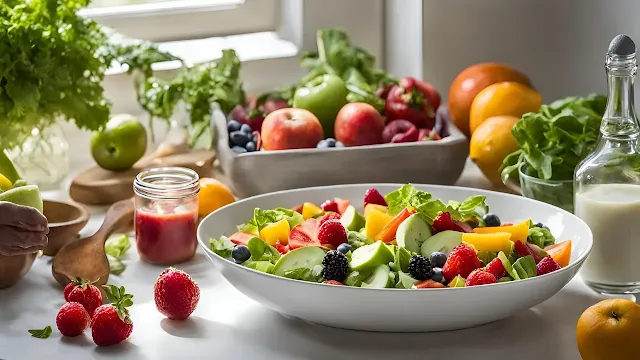Achieving a balanced life is like walking a tightrope—it requires focus, dedication, and a bit of finesse. One of the most crucial elements of maintaining this balance is healthy eating habits. But what does it mean to eat healthily, and how can it support our overall well-being? Let’s dive into the secrets of nutritious eating that not only fuel our bodies but also enhance our mental and emotional health.
 |
| Balanced Life - Healthy Eating Habits |
What is a Balanced Life?
A balanced life encompasses various aspects, including physical health, mental clarity, emotional stability, and social connections. It's about harmonizing these elements to live a fulfilling and stress-free life. Nutrition plays a pivotal role in this harmony. Just as a car needs the right fuel to run efficiently, our bodies require the right nutrients to function optimally.
Understanding Healthy Eating Habits
So, what exactly constitutes healthy eating? It's more than just counting calories or avoiding certain foods. Healthy eating is about balance, variety, and moderation. It means consuming a diverse range of foods to ensure your body gets all the essential nutrients it needs. This approach not only supports physical health but also keeps your mind sharp and your mood stable.
Benefits of Healthy Eating for a Balanced Life
Healthy eating has a myriad of benefits. Physically, it helps maintain a healthy weight, supports a strong immune system, and reduces the risk of chronic diseases such as diabetes, heart disease, and cancer. Mentally, the right nutrients can improve brain function, enhance memory, and boost mood. Emotionally, a well-balanced diet can help stabilize mood swings and reduce symptoms of depression and anxiety. When your body feels good, so does your mind, leading to an overall sense of well-being.
Key Nutrients for a Balanced Diet
To achieve a balanced life, it’s essential to understand the key nutrients your body needs:
- Macronutrients: These include proteins, carbohydrates, and fats. Proteins are the building blocks of our bodies, helping to repair tissues and build muscle. Carbohydrates are the body's main energy source, and fats are vital for cell function and overall health.
- Micronutrients: These are vitamins and minerals required in smaller amounts but are crucial for proper body function. For instance, Vitamin D helps with calcium absorption for bone health, and iron is necessary for transporting oxygen in the blood.
Creating a Balanced Meal Plan
Planning your meals can be a fun and rewarding way to ensure you're getting a balanced diet. Start by incorporating a variety of foods from all food groups. Aim for colorful plates—more colors often mean more nutrients. For breakfast, consider oatmeal with berries and nuts. Lunch could be a quinoa salad with mixed vegetables and grilled chicken. For dinner, try baked salmon with steamed broccoli and sweet potatoes. Don’t forget snacks—opt for fruits, nuts, or yogurt.
Incorporating Fruits and Vegetables
Fruits and vegetables are powerhouses of essential nutrients. They are rich in vitamins, minerals, fiber, and antioxidants, which help fight off diseases and keep your body in top shape. Try to fill half your plate with fruits and vegetables at each meal. Add them to smoothies, salads, or even main dishes. The more variety, the better.
Healthy Eating on a Budget
Eating healthy doesn’t have to be expensive. With a bit of planning, you can enjoy nutritious meals without breaking the bank. Buy seasonal produce, which is often cheaper and fresher. Consider frozen fruits and vegetables—they are just as nutritious and have a longer shelf life. Plan your meals around sales and discounts, and don’t shy away from buying in bulk.
Mindful Eating Practices
Mindful eating is about being present during meals and paying attention to your body’s hunger and fullness cues. It involves eating slowly, savoring each bite, and appreciating the food. This practice can prevent overeating and help you enjoy your food more. Try turning off the TV and putting away your phone during meals. Focus on the taste, texture, and aroma of your food.
The Impact of Hydration on a Balanced Life
Staying hydrated is just as important as eating the right foods. Water is essential for every cell in your body. It aids in digestion, keeps your skin healthy, and helps regulate body temperature. Aim to drink at least 8 glasses of water a day. If plain water isn’t appealing, try adding a slice of lemon or cucumber for a refreshing twist.
Snacking Smartly
Snacks can be part of a balanced diet if you choose wisely. Opt for nutrient-dense snacks that provide energy and keep you satisfied between meals. Good choices include a handful of nuts, a piece of fruit, or yogurt. Avoid snacks high in sugar and unhealthy fats, such as chips and candy.
Reducing Sugar and Processed Foods
High sugar intake and processed foods can wreak havoc on your health. They are often loaded with empty calories, which can lead to weight gain and other health issues. Instead, satisfy your sweet tooth with natural sugars from fruits and opt for whole foods over processed options. Read labels carefully and choose items with minimal added sugars.
Eating Out and Staying Balanced
Dining out doesn’t have to derail your healthy eating habits. Many restaurants offer healthy options, and with a bit of strategy, you can make wise choices. Look for dishes that are grilled, baked, or steamed. Ask for dressings and sauces on the side, and don’t be afraid to customize your order to suit your dietary needs.
Meal Prepping for Success
Meal prepping is a great way to ensure you stick to your healthy eating goals, even on busy days. Spend a few hours each week planning and preparing your meals. Cook in batches and store meals in individual portions. This not only saves time but also prevents the temptation of grabbing unhealthy options on the go.
Conclusion
Living a balanced life is within your reach, and healthy eating is a key component. By understanding and implementing these healthy eating habits, you can enhance your physical health, boost your mental clarity, and enjoy a more balanced, fulfilling life. Remember, it’s not about perfection but about making better choices consistently. Start small, stay committed, and you’ll soon see the positive changes in your life.
FAQs
What is the best way to start eating healthy?
Start by incorporating more fruits and vegetables into your diet and gradually reduce processed foods and sugary snacks. Plan your meals and stay hydrated.
How can I maintain a balanced diet with a busy schedule?
Meal prepping and planning are crucial. Spend a few hours each week preparing your meals in advance. Keep healthy snacks on hand and stay hydrated.
Are there any specific foods I should avoid?
Limit intake of sugary drinks, processed foods, and high-fat, high-sugar snacks. Focus on whole, nutrient-dense foods.
How do I deal with cravings for unhealthy foods?
Identify the triggers for your cravings and find healthier alternatives. Stay hydrated, and don’t skip meals, as this can lead to stronger cravings.
Can healthy eating really improve my mental health?
Yes, a balanced diet rich in essential nutrients can improve brain function, enhance mood, and reduce symptoms of depression and anxiety.


